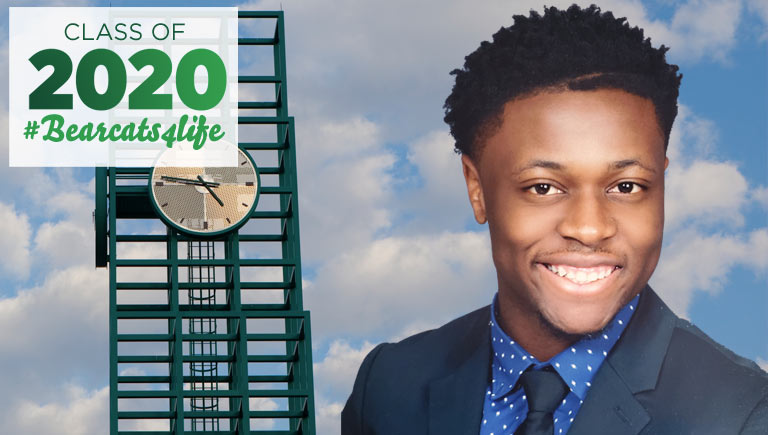Alumni Spotlight: David Oladunjoye ’20
While studying programming and digital design, Oladunjoye took part in a number of interesting projects.

The skills needed to earn a computer engineering degree can lead students along unexpected paths, but it’s hard to think of two projects further apart than making music and saving lives.
Yet those were just two of the problems that David Oladunjoye ’20 tackled during his time at Binghamton University’s Thomas J. Watson College of Engineering and Applied Science.
The Bronx native became interested in technology as part of his high school robotics team, and one of his teachers — a Binghamton alumnus — encouraged him to check out Watson College. He added it to his list of colleges to look at.
“Compared to other campuses, Binghamton was very nice,” Oladunjoye said. “I really liked the environment and energy in the [University] Union — it was very social and engaging. Later, I got to see the ITC [Innovative Technologies Complex] and other facilities, and it reinforced my decision to come here.”
He funded part of his undergraduate degree through the Ronald E. McNair Post-Baccalaureate Achievement Program, known informally as the McNair Scholars program. The federally funded program, named after the scientist and astronaut who lost his life in the 1986 Challenger disaster, is designed to prepare students for doctoral studies through research and other scholarly activities.
While studying programming and digital design, Oladunjoye took part in a number of interesting projects, one of which was a mine-sweeping robot — a technology that would be very useful in current or former war zones around the world.
“We had a rover that we were assigned at the beginning of the year,” he said, “and we had to program it to sweep a maze and find mines on the ground — they were just metal washers — using a metal detector.”
As part of his McNair Scholars summer research, Oladunjoye worked with Associate Professor Scott Craver on creating a virtual violin using a process called low-complexity commuted string synthesis.
“We tried to replicate all of the physical properties of using the bow and hitting the strings to create the vibrations using code,” he said.
Outside of the classroom and lab, Oladunjoye served as the public relations co-chair for the Binghamton chapter of the National Society of Black Engineers, and he also worked as an undergraduate assistant for the Watson College and the Harpur College of Arts and Sciences’ Physics Department.
One of his favorite off-campus activities was working with Johnson City High School students, also through the McNair Scholars program. While doing STEM-related projects with them and acting as a mentor, he was surprised by how receptive and energetic they were.
“It’s important for them to see where they might go if they are interested in science and engineering,” he said. “It’s also important for the future of STEM, because we need to pass the baton. The more, the merrier — everyone is contributing ideas and bringing things to the table, which helps with the progression of research.”
This summer, Oladunjoye — while social distancing, of course — is interning with Qualcomm’s wireless division. His next move? Staying at Binghamton to earn a master’s degree in 2021 through Watson College’s 4+1 program.
“I looked at other [graduate] schools in addition to the 4+1 program,” he said. “After getting accepted to some of them and seeing what they offered, I saw that the 4+1 [at Binghamton] was a lot better in terms of cost — that was one of the biggest things — and in terms of time, as well.”
Helping him to his MS degree is the GEM Fellowship Program, funded through the National GEM Consortium to increase the participation of underrepresented groups at the master’s and doctoral levels in engineering and science. It provides a full scholarship and living stipend, as well as summer internship opportunities.
“The journey to becoming a GEM fellow taught me a lot about myself and my academic career,” he said. “I had to take tests and write personal statements, so I had to slow everything down and ask myself some important questions: What will I actually be doing with my master’s degree? How will I be able to do this? I also had to talk about my research, so it made me understand the significance of what it does and the importance of the results.”
He sees another year at Binghamton as being ahead of the game, since he’ll already know his way around and have a support system in place.
“You need to have friends and people you can rely on, because college isn’t supposed to be a one-man show. I learned how to work with others productively inside and outside the classroom,” he said, adding with a laugh: “Just having a roommate, being able to get groceries and staying alive for an entire semester was an accomplishment!”
